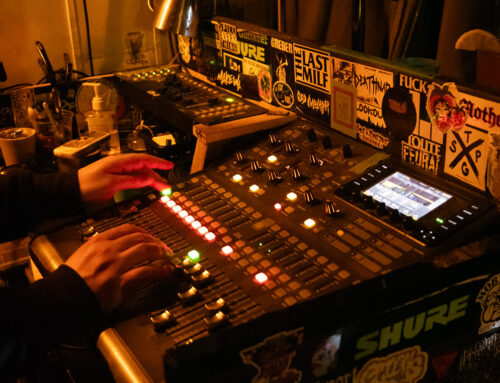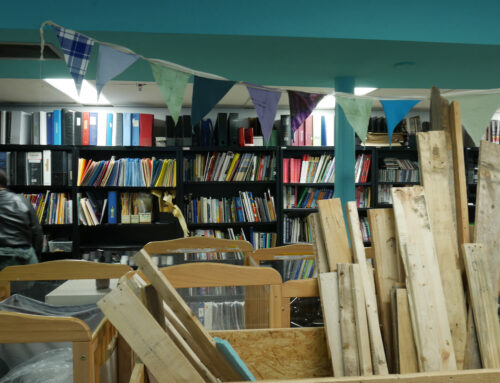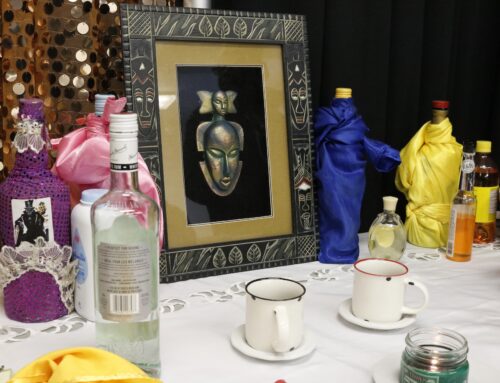BY Ana Acosta & Aaron Bauman
Punk has been a significant part of Louis-Pierre’s Bilodeau life after entering the underground music scene 20 years ago. Known as Wawa in the scene, he began booking shows in Sherbrooke and later moved to Montreal where he began producing music with a friend.
“We were like 18 or 20, and it was really a need for us to have DIY or smaller punk shows,” he says.
Wawa remembers starting out in the early 2000s, when metal dominated the underground scene, but it was his passion for punk that drove him to seek something more.
“There was, you know, rhyme metal shows and death metal shows and hardcore in the early 2000s that were super popular,” he says. “Those were fun shows, but I really wanted punk shows.”
Wawa was used to booking classic house, garage and basement shows and felt that there was a lack of independent spaces for artists. This inspired him to create DIY venues such as Bâtiment 7, which he collaborates to maintain alongside others from the punk community.
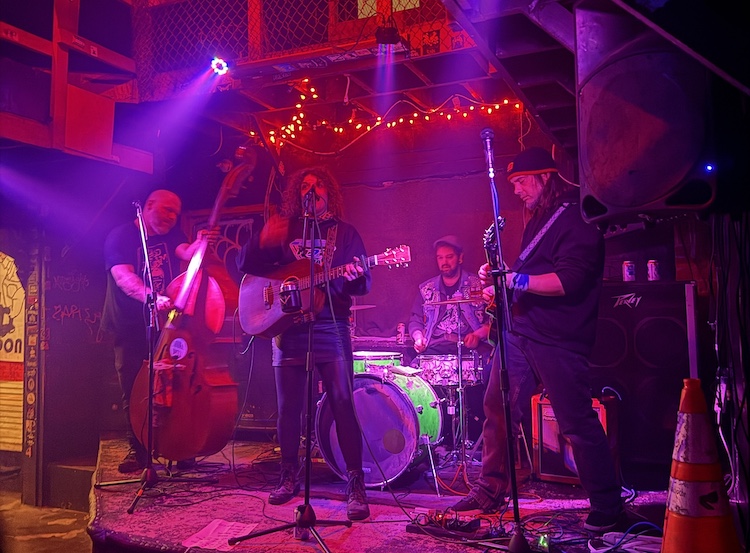
The band Smoke Spell playing on stage. Photo by Ana Acosta.
DIY venues are essentially non-profit and are collectively created for the sake of creating and consuming local, raw music.
“On a physical and social level, there’s essentially no boxes and no profit to be made,” Wawa says. “We make our own decisions, our own working conditions.”
DIY venues in Montreal are often hidden in industrial zones or near train tracks, in hopes of minimizing noise complaints and avoiding restrictive regulations that clash with the scene’s essence.
“We would have shows that we’d really try to have them done, or it was a rule to have them done by 10:30 p.m. so there wouldn’t be noise complaints, but there still was,” he says.
DIY venues are essentially non-profit and are collectively created for the sake of creating and consuming local, raw music.
“On a physical and social level, there’s essentially no boxes and no profit to be made,” Wawa says. “We make our own decisions, our own working conditions.”
DIY venues in Montreal are often hidden in industrial zones or near train tracks, in hopes of minimizing noise complaints and avoiding restrictive regulations that clash with the scene’s essence.
“We would have shows that we’d really try to have them done, or it was a rule to have them done by 10:30 p.m. so there wouldn’t be noise complaints, but there still was,” he says.
Many music venues in Montreal have fallen victim to noise complaints. Such is the case of La Tulipe, a theater built in the 1900s which was closed in September 2024 due to several complaints from the neighborhood.
Map of some of the music venues that have closed down due to noise complaints in the past 10 years by Ana Acosta.
“We passed a bylaw four years ago, five years now, that a new housing unit cannot be created right next door to a music venue,” says Julien Deschênes, political attaché for the Plateau-Mont-Royal borough.
“There was a mistake by one of our agents here at the Plateau authorizing this new unit to be installed near La Tulipe,” Deschênes says. “The new owner of that unit complained multiple times because of the noise coming from the La Tulipe.”
According to Deschênes, the Plateau-Mont-Royal borough is imposing different regulations to prevent situations like this from happening again.
“We’re trying to implement this principle where the new person that comes around a building or a music venue is the one that has to insulate their own building because of the pre-existing condition” he says.
Still, the distress among the community persists and gentrification is still a major concern for collective owners and collaborators of independent spaces.

Two men share a beer away from the crowd. Photo by Ana Acosta.
So is the case of Fatten Lager, part of the collective running La Biu, another DIY venue.
“We lost Cafe Chaos, Catacombs is gone,” he says. “So, when we heard that this place [La Tulipe] was shutting down, I know for myself, I kind of felt like if I could have done something and didn’t, I would have regretted it.”
Although Fatten had no prior experience running a venue, he was able to do so with the help of his community.
From the stage to the lightning and even the bar, it was all collectively repaired through the help of people in the punk scene.
“Honestly, we had a lot of people, just from the community,” he says. “This bar was built by people that work for Cirque du Soleil, and they donated it to us because they just wanted us to have it.”
Despite these spaces being unregulated, Fatten says the purpose of DIY venues is to create a safe space in and enjoy some good music.
“The community has really shown that they believe in what we want to do, and we want this place to really be a DIY community space,” he says.
Concerns about safety, sanitation, and accountability have been an issue of dispute between DIY venue organizers and local authorities. Without proper permits, these spaces often operate in legal grey areas, making them vulnerable to shutdowns and fines.
“It’s not the first time that that kind of concept pops up,” says Martin Vézna, Vice President of Public Affairs at the Quebec Restaurant Association. “But as a principle, that kind of activity is illegal.”
For most people in the scene, music is not a source of income, but rather a passion that has given them a community and a place to express themselves freely.
For many up-and-coming musicians, breaking into the industry isn’t just about talent—it’s about survival. With the rising cost of instruments, rehearsal spaces, and touring, independent bands are relying on DIY venues and community-driven spaces to keep their music alive. Video by Aaron Bauman.
“It’s my passion and my hobby at the same time.” says Krystle Mckillop, lead singer of Smoke Spell, a local folk/punk band.
Alternative spaces provide a sense of the punk scene that large venues lack, according to musicians like Mckillop who perform in DIY venues like La Biu.
“At bigger venues, you always feel like you’re doing something wrong, like somebody is going to yell at you and tell you not to do that,” she says.
Mckillop points out that the punk scene is easy to find, either through word of mouth, flyers or in websites like askapunk.net, where many of these underground events are published.
“If you really want music, you can find it in an underground venue, in somebody’s basement, outside in a field, you’ve just got to look for it and find it. It’s always there,” she says.
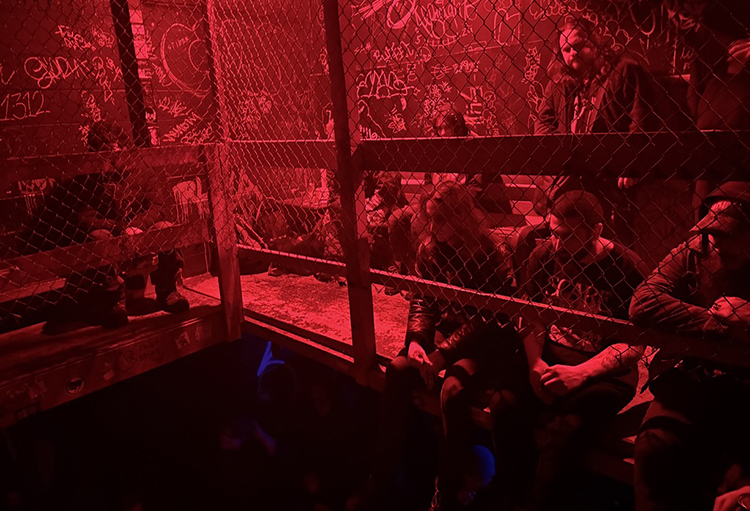
A crowd listens to the band Bigger Lies on the second floor of La Biu. Photo by Ana Acosta.
Despite the challenges of rising rent, noise complaints, and gentrification, Montreal’s DIY punk scene continues to adapt and thrive through collective resilience.
As long as there’s a need for independent spaces, those within the scene remain committed to keeping punk alive on their own terms.


